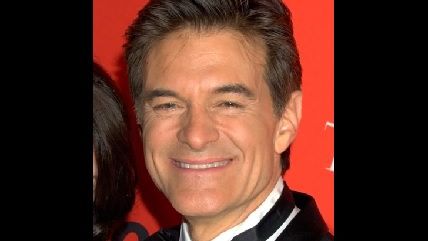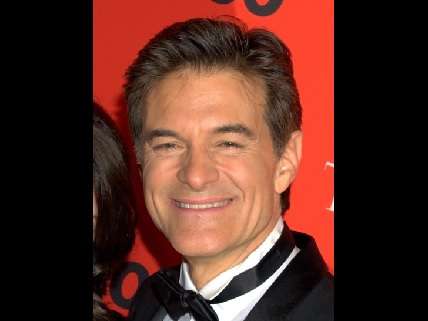In Defense of Dr. Oz
Congress took Dr. Oz to task for offering dietary advice. One needn't have any affection for Oz to recognize the chilling effect this has on free speech.


Last week, Dr. Oz went to Washington. That would be Dr. Mehmet Oz, medical doctor, daytime television host, advice columnist, and—many claim—huckster. Oz traveled to the nation's capital after being summoned by Congress to explain his endorsements of a variety of foods and supplements he claims are healthy.
Oz is controversial for a variety of reasons. He has claimed, for example, that foods and supplements from green coffee extract to raspberry ketones to garcinia cambogia (whatever those are) have unique fat-burning properties.
Critics of his longstanding opposition to GMOs and support for herbal supplements and other alternative medicines point to what they say is his lack of interest in science and data, often painting him as nothing more than a quack.
They point to the fact that Oz's syndicated show frequently features appearances by other controversial "experts," including Dr. Joseph Mercola.
Criticism of Oz's views is becoming as mainstream as some of his beliefs are outside of that same mainstream.
Take, for example, an excellent New Yorker profile of Oz last year in which it was clear that the writer, Michael Specter, is clearly befuddled by the apparent chasm between Oz's impressive Ivy League credentials and his appeal to the fantastic.
"Oz is an experienced surgeon, yet almost daily he employs words that serious scientists shun, like 'startling,' 'breakthrough,' 'radical,' 'revolutionary,' and 'miracle,'" writes Specter. "There are miracle drinks and miracle meal plans and miracles to stop aging and miracles to fight fat."
But it's not just highbrow publications like the New Yorker that have seen fit to rip Oz's claims to shreds.
Even outlets like Entertainment Weekly feel empowered to take a swing at some of the good doctor's claims about food.
Ripping on Dr. Oz has become a cottage industry. And that's a good thing.
It's not good just because I'm no fan of Oz (which I'm not). It's good because it means that the marketplace of ideas is doing its job. Members of the media and scientific community are exposing what they argue are Oz's intellectual and factual shortcomings.
But that's also one reason that I find Oz's appearance before a Senate consumer protection committee last week to be incredibly troubling.
"I don't get why you need to say this stuff because you know it's not true," said Sen. Claire McCaskill (D-MO), the committee chair, in pointed remarks directed at Oz. "Why, when you have this amazing megaphone, and this amazing ability to communicate, why would you cheapen your show by saying things like that?"
Personally, I don't get why McCaskill uses her own amazing megaphone to waste taxpayer money on farm subsidies, dairy supports, and corn ethanol. But then again, I don't wield the power of the U.S. Senate and thus don't have the luxury of demanding that she explain these indefensible stances she's taken.
And what of Oz's belief in, say, green coffee extract? What if he truly believes in it, wants to make money off of it, or some combination of the two?
Oz has absolutely zero responsibility to hold mainstream views and every right to make money off of those views. His popularity has absolutely no impact on his right to say whatever the hell he wants to say. And being hauled before Congress for saying what he wants places a tremendous burden on his, your, and my First Amendment rights. While Sen. McCaskill's actions are nowhere near those of Sen. Joseph McCarthy decades earlier, the chilling effect that Congress can have on speech can't be understated and shouldn't be forgotten.
Many of Dr. Oz's detractors seized on the hearing. Schadenfreude, they beamed.
One of those who couldn't hide their joy over Sen. McCaskill's takedown of Oz is Prof. David Gorski, who teaches surgery at Wayne State University School of Medicine and serves as managing editor of the blog Science-Based Medicine, where he sometimes blogs under the pseudonym "Orac."
Gorski, one of Oz's most persistent and thoughtful critics, referred to Oz earlier this year as "America's quack."
"He can't simply dispense with facts he doesn't find convenient," Gorski told the New Yorker, in the aforementioned profile of Oz. "Oz has a huge bully pulpit, with the entire Oprah empire behind him."
Actually, Oz can dispense with the facts if he chooses. His bully pulpit and Oprah backing have nothing to do with his right to speak his mind.
It might make Gorski's life less fulfilling that he feels compelled to have to publish post after post refuting Oz's latest claims. But that's how the First Amendment works—rightly defending both Oz and Gorski equally.
Congress ripped Dr. Oz a new one last week. It's not hard to imagine that the Food Babe, Gwyneth Paltrow, and the publishers of 9 out of 10 diet books can't be far behind. What's more, if objective truth is the new standard for permissible speech here in Washington, D.C, then we can at least bask in knowing we're not long for Congress itself.


Show Comments (70)